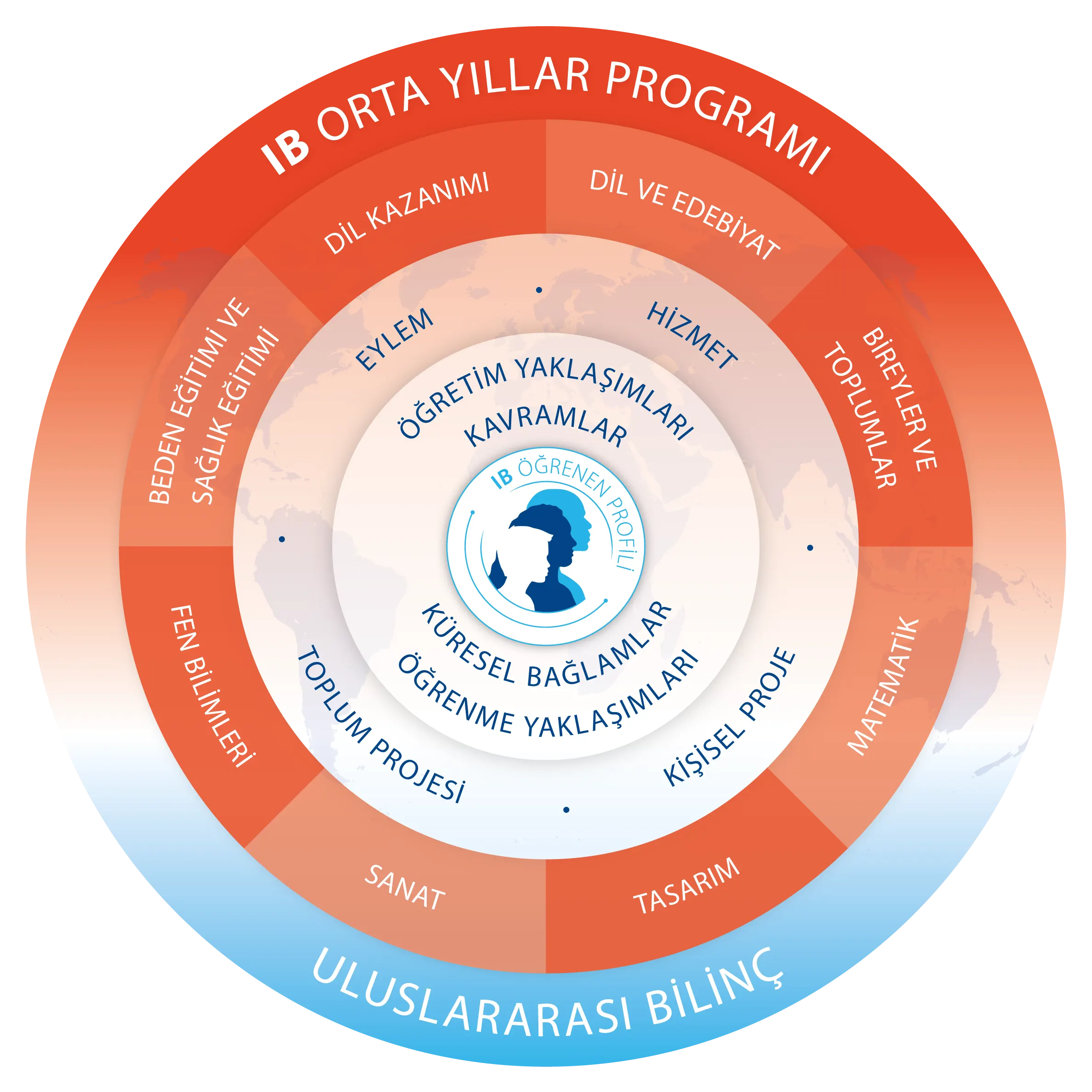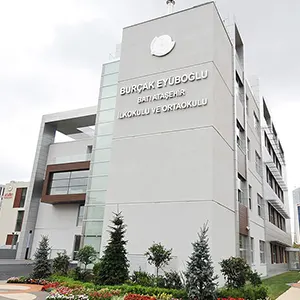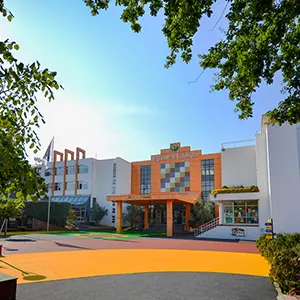
The International Baccalaureate Middle Years Program (IB MYP)
The International Baccalaureate Middle Years Program (IB MYP) is an educational model designed to meet the learning needs of students aged 10 to 16. Eyüboğlu Educational Institutions began implementing the IB Middle Years Program in the 1999-2000 academic year.
Why MYP?
The MYP not only fulfills the requirements of the national curriculum implemented in Turkey but also enables students to better establish interdisciplinary connections and critically examine their place and roles in the world.
MYP is built upon three essential elements that underpin its development, both internationally and in the schools where it is implemented. These are:
- Holistic Learning
- Intercultural Awareness
- Communication
The fundamental components of MYP's curriculum framework complement both the national curriculum implemented in Turkey and Eyüboğlu Educational Institutions' educational philosophy. MYP distinguishes itself with its innovative approach to conceptual learning, which ensures lasting education for students.
Holistic Learning emphasizes approaching situations and issues with a global perspective, highlighting interdisciplinary connections. Students should be aware of their own learning and perceive knowledge as an interconnected whole.
According to the MYP, achieving success relies on deep and meaningful learning that is connected to the student's personality, interests, identity, or future.
Intercultural Awareness aims to enhance students' attitudes, knowledge, and skills as they learn about their own national cultures as well as the cultures of other societies. It encourages students to approach events and situations with different perspectives, thereby increasing tolerance and respect for other cultures.
In the MYP, great emphasis is placed on communication in various forms and in at least two languages. There is a significant connection between language proficiency and understanding cultures. This applies to Language and Literature and Language Acquisition courses in the student's mother tongue.
Across all eight subject groups, there are learning approaches, teaching approaches, concepts, and global contexts that foster connections between individual development and learning experiences. These global contexts and key concepts are common to every subject and all disciplines. In the program's final year, students work on a personal project in which they demonstrate all the skills they have acquired throughout the MYP years.
While the eight subject groups provide a broad, traditional knowledge base, the pedagogical tools used to convey this knowledge aim to increase students' awareness of the relationships between subjects.
The IB MYP aims to equip students with the following:
- A habit and capacity for lifelong learning.
- The ability to adapt to rapidly changing realities.
- Problem-solving and application skills, along with intellectual curiosity.
- The necessary skills and self-confidence to take action individually and collaboratively.
- An awareness of global issues and a desire to act responsibly.
- Effective communication skills that can transcend national boundaries.
- Respect for others and an appreciation of both similarities and differences.
The IB MYP subject groups are as follows:
- Language and Literature
- Language Acquisition
- Individuals and Societies
- Design
- Mathematics
- Sciences
- Arts
- Physical and Health Education
The MYP subject groups encompass various aspects of learning, including knowledge, understanding, skills, and attitudes. They allow for the use of diverse teaching and learning approaches and are broad enough to meet specific requirements outlined by the Ministry of National Education.
What are the Global Contexts?
Global Contexts form the distinctive foundation of MYP. These six contexts are addressed in all subjects, allowing students to integrate the contents of their subjects with the world beyond the classroom. This integration helps students recognize the connections between classroom content and the outside world rather than seeing subjects as separate, unrelated domains.
Global Contexts provide a common language that enables the identification of specific events or situations that offer powerful contextual learning, teaching, and learning from a more concrete perspective. Selecting a global context for learning answers the following questions:
Why are we inquiring into this?
Why are these concepts important?
Why does understanding matter?
Why do people care about this topic?
In the MYP, global contexts provide common points of entry for inquiring into what it means to think internationally and a framework for a curriculum that promotes multilingualism, intercultural understanding, and global engagement.
Global contexts inspire a shared humanity and a common guardianship of our planet. They encourage explorations into significant real-life issues that concern individuals aged 11 to 16, whether they are of local, national, or global relevance. For each MYP unit, a global context is identified, focusing on meaningful teaching within an international educational program.
In the MYP process, students encounter all six global contexts, which are explained below:
IDENTITIES AND RELATIONSHIPS
Students explore identity, beliefs, and values, as well as personal, physical, mental, social, and spiritual health. They delve into human relationships that encompass families, friends, communities, and cultures, discovering what it means to be human.
ORIENTATION IN SPACE AND TIME
Students explore personal, local, and global perspectives on their personal histories, their homes and journeys, turning points in humanity, discoveries, explorations, and migrations of humanity, relationships and connections between individuals and civilizations.
PERSONAL AND CULTURAL EXPRESSION
Students explore the ways we discover and express our ideas, emotions, nature, culture, beliefs, and values; the ways we alternately think about, expand, and enjoy our creativity; and our sense of aesthetics.
SCIENTIFIC AND TECHNICAL INNOVATION
Students explore the natural world and its laws, interactions between humans and the natural world, how humans understand scientific principles, the impact of scientific and technological developments on societies and environments, the effects of environments on human activities, and how humans adapt their environments to their needs.
GLOBALIZATION AND SUSTAINABILITY
Students explore the interconnectedness of human-made systems and communities, the relationship between local and global processes, how local experiences mediate global processes, the opportunities and tensions of world interconnectedness, and the impact of decisions on humanity and the environment.
FAIRNESS AND DEVELOPMENT
Students explore rights and responsibilities, the relationship between communities, sharing limited resources with other people and living beings, access to equal rights, peace, and conflict resolution.
Approaches to Learning (ATL) skills in IB MYP – What are the ATL Skills?
How do I learn best?
How do I know?
How do I express what I know?
Approaches to Learning (ATL) are of great importance within the program because they aim to foster students' critical, consistent, and independent thinking; enhance problem-solving and decision-making skills; and develop the intellectual discipline, attitudes, strategies, and skills.
With the principles of learning skills, MYP aims to develop independent students who can successfully manage and direct themselves to adapt to changing conditions while nurturing the lifelong learning needs of each student.
These skills are:
- Communication Skills
- Social Skills
- Self-Management Skills
- Research Skills
- Thinking Skills
These go far beyond study skills and encompass "learning to learn," becoming conscious of thinking processes, and the strategic use of these processes. In addition to the counseling department, teachers at each grade level and subject group teachers work closely together to achieve the goals in this area.
What is a Community Project?
The community project is a long-term project that 7th-grade students begin in the second half of the academic year and complete in the 8th grade. During this process, students have the opportunity to learn by serving and creating awareness about community needs. Students can prepare the project individually or in groups of up to three people. They conduct research and planning in line with the principles of academic honesty and carry out actions to meet the needs of the community. At the end of the project, students evaluate their work with reflective thinking. Throughout the project, a mentor teacher guides the students. At the end of the community project, students' project presentations are evaluated by a group of teachers, including the mentor teacher.
What is a Personal Project?
The "Personal Project" is a project prepared over a broad period that extends from the end of the 9th grade to the second semester of the 10th grade. It provides students with an opportunity to create and report on a real project on a topic of their own choice. Students are not limited to predefined topics in various subject areas for the Personal Project. In the Personal Project, the focus is on both the Approaches to Learning Skills used by the student in implementing the chosen product based on their personal interest and the written report that describes this process.
Each student works with a mentor teacher selected from the school's teaching staff. The mentor's role is to guide the student in research, planning, and completing the project and to ensure the originality of the student's work.
How does IB monitor the implementation of the MYP at Eyüboğlu?
ASSESSMENT OF STUDENT WORK
In each year of MYP, students are assessed for each subject using four different criteria published by the IB. These assessments, scored out of 32, are reported in the MYP report within the Eyüboğlu Management System. The Personal Project, completed at the end of the 10th grade, is evaluated by teachers based on the criteria published by the IB. Personal Projects that have been assessed according to the IB MYP criteria are submitted for moderation to the International Baccalaureate Organization. At the end of the process, each student receives a certificate from the IB that reflects their Personal Project achievements.
MYP AUTHORIZATION AND EVALUATION
Every school wishing to officially implement the MYP is visited by a team of at least three experienced MYP practitioners, after a certain period of preparations and training, to determine whether the school is fully prepared to implement the MYP. Once the school receives official authorization (the authority to implement the program), it is reevaluated every three to five years. The evaluation visits help ensure the quality of the program in participating schools and also assist schools in self-assessment efforts and curriculum development procedures.
REFERENCES
MYP: From Principles into Practice-IB (International Baccalaureate Organisation). Cardiff: IB,2014



